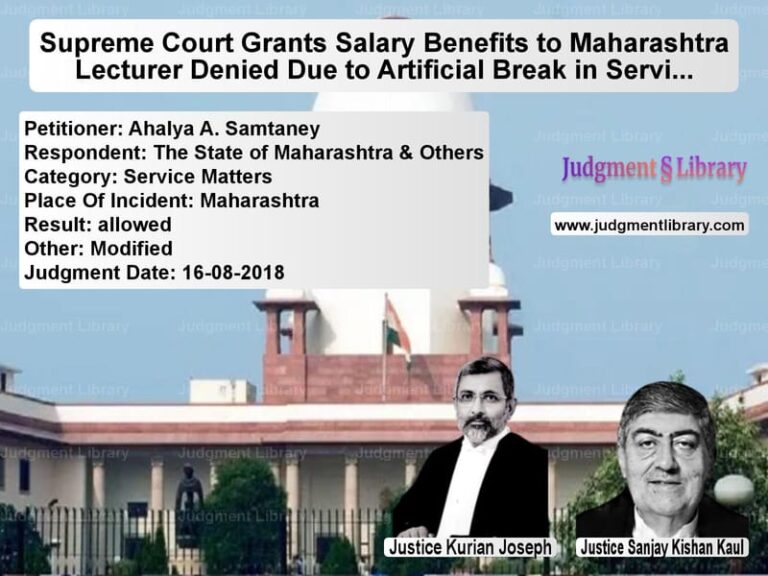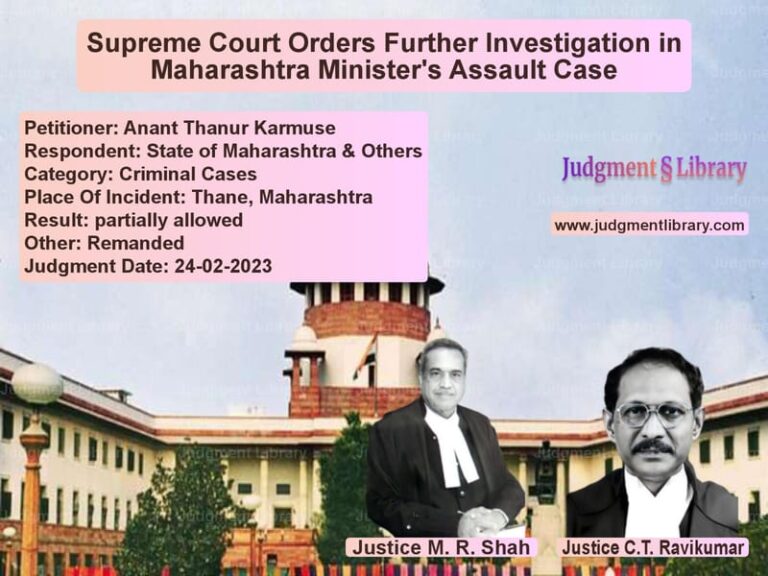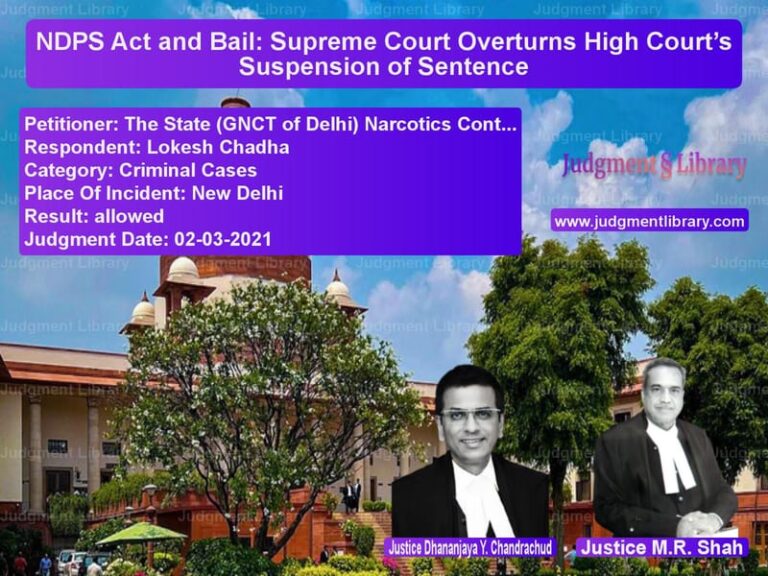Harijan Bhala Teja vs. State of Gujarat: Supreme Court Upholds Conviction for Wife’s Murder
The Supreme Court of India, in its judgment dated April 27, 2016, ruled in favor of upholding the conviction of Harijan Bhala Teja for the murder of his wife, Jivibai. This case involved the question of whether the Gujarat High Court was correct in overturning the trial court’s acquittal and convicting the accused under Section 302 IPC. The Supreme Court, after reviewing the evidence, dismissed the appeal and confirmed the conviction.
Background of the Case
The appellant, Harijan Bhala Teja, was the husband of the deceased, Jivibai. They lived together in village Nani Chirai, Gujarat. At the time of her death, Jivibai was eight months pregnant. The prosecution alleged that she was strangulated to death by the appellant on February 20, 1985, between 8 AM and 12 PM. Without informing or waiting for relatives, the appellant hurriedly buried her body.
Her father, Vaja Ala (PW-1), learned about her death on March 1, 1985, and suspected foul play. He lodged a complaint at the police station, leading to an investigation. The body was exhumed, and a post-mortem confirmed that she had died due to asphyxia caused by strangulation. The appellant was charged under Sections 302 and 201 IPC.
Trial Court’s Decision
The Additional Sessions Judge, Bhuj, held the trial and, on December 31, 1985, acquitted the accused. The court found that the prosecution had failed to prove the charge beyond a reasonable doubt.
High Court’s Ruling
The State of Gujarat appealed against the acquittal. On July 15, 2008, the Gujarat High Court found that the trial court’s decision was perverse and against the weight of the evidence. It convicted the accused under Section 302 IPC, sentencing him to life imprisonment and a fine of Rs. 100.
Legal Issues
- Whether the High Court was justified in reversing the trial court’s acquittal.
- Whether the circumstantial evidence was sufficient to prove guilt beyond a reasonable doubt.
- Whether the accused’s conduct after the death indicated guilt.
Arguments by the Petitioner
- The appellant argued that the prosecution failed to establish that Jivibai died due to strangulation.
- The defense pointed out that Dr. Gopal Karsan Hirani (PW-5), who conducted the post-mortem, was not conclusive in his statement regarding strangulation.
- The appellant claimed that the fracture of the hyoid bone could have resulted from external pressure due to burial.
- The defense also argued that there was no motive for the alleged murder.
Arguments by the Respondents
- The State contended that the prosecution had established the cause of death as strangulation.
- The prosecution relied on medical evidence, which showed a half-round dark green-colored injury on the neck and a fracture of the hyoid bone.
- They argued that the accused’s failure to inform the deceased’s family or conduct a proper funeral indicated guilt.
- Prosecution witnesses, including the deceased’s father and village sarpanch, testified that there were prior disputes between the accused and the deceased.
Supreme Court’s Observations
The Supreme Court examined the evidence and made the following key observations:
- The deceased was last seen with the appellant, and he failed to explain her death adequately.
- Medical evidence confirmed strangulation, supported by a fractured hyoid bone and ligature marks.
- The accused’s conduct in hurriedly burying the body without informing relatives pointed to an attempt to conceal the crime.
- The High Court was correct in interfering with the trial court’s acquittal, as the findings were against the weight of evidence.
Supreme Court’s Ruling
The Supreme Court ruled against the accused, holding that:
- The conviction and life sentence awarded by the High Court were justified.
- The trial court’s acquittal was based on a misreading of the evidence.
- The appeal was dismissed, and the accused would continue serving his life sentence.
Key Takeaways from the Judgment
- Significance of Medical Evidence: The judgment reaffirmed that medical findings, such as a fractured hyoid bone, are crucial in homicide cases.
- Last Seen Theory: The accused’s failure to explain the victim’s death was a critical factor in establishing guilt.
- Burden of Proof in Circumstantial Evidence: The ruling upheld that when circumstantial evidence is strong, the burden shifts to the accused to provide an alternative explanation.
- Judicial Review of Acquittals: The case clarified that appellate courts can overturn acquittals if the findings are perverse or against the evidence.
Conclusion
The Supreme Court’s ruling in Harijan Bhala Teja vs. State of Gujarat reinforces the principle that circumstantial evidence, when properly established, is sufficient for conviction. By upholding the High Court’s decision, the judgment ensures that justice is served in cases of domestic homicide. This ruling sets an important precedent for future cases involving similar circumstantial evidence.
Don’t miss out on the full details! Download the complete judgment in PDF format below and gain valuable insights instantly!
Download Judgment: Harijan Bhala Teja vs State of Gujarat Supreme Court of India Judgment Dated 27-04-2016-1741854709476.pdf
Direct Downlaod Judgment: Direct downlaod this Judgment
See all petitions in Murder Cases
See all petitions in Custodial Deaths and Police Misconduct
See all petitions in Attempt to Murder Cases
See all petitions in Judgment by A.K. Sikri
See all petitions in Judgment by Prafulla C. Pant
See all petitions in dismissed
See all petitions in supreme court of India judgments April 2016
See all petitions in 2016 judgments
See all posts in Criminal Cases Category
See all allowed petitions in Criminal Cases Category
See all Dismissed petitions in Criminal Cases Category
See all partially allowed petitions in Criminal Cases Category







